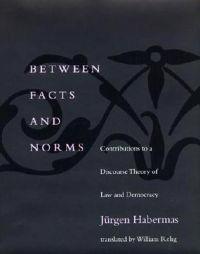The Structural Transformation of the Public Sphere: An Inquiry Into a Category of Bourgeois Society (Häftad)
avJurgen Habermas, J?rgen Habermas, J. Rgen Habermas
ISBN: 9780262581080 - UTGIVEN: 199108This is Jurgen Habermas's most concrete historical-sociological book and one of the key contributions to political thought in the postwar period. It will be a revelation to those who have known Habermas only through his theoretical writing to find his later interests in problems of legitimation and [...]
Moral Consciousness and Communicative Action: Copernicus and Kepler (Häftad)
avJurgen Habermas, J?rgen Habermas, J. Rgen Habermas
ISBN: 9780262581189 - UTGIVEN: 199210This long-awaited book sets out the implications of Habermas's theory of communicative action for moral theory. "Discourse ethics" attempts to reconstruct a moral point of view from which normative claims can be impartially judged. The theory of justice it develops replaces Kant's categorical impera[...]
Justification and Application: Remarks on Discourse Ethics (Häftad)
avJurgen Habermas, J?rgen Habermas, J. Rgen Habermas
ISBN: 9780262581363 - UTGIVEN: 199409This collection of four essays and an interview contains Habermas's most recent contributions to ethical theory. It expands and clarifies the work on discourse ethics presented in Moral Consciousness and Communicative Action. Here, largely in response to criticisms from contemporary neo-Aristotelian[...]
Between Facts and Norms: Contributions to a Discourse Theory of Law and Democracy (Häftad)
avJurgen Habermas, J?rgen Habermas, J. Rgen Habermas
ISBN: 9780262581622 - UTGIVEN: 199801In Between Facts and Norms Jurgen Habermas works out the legal and political implications of his Theory of Communicative Action (1981), bringing to fruition the project announced with his publication of The Structural Transformation of the Public Sphere in 1962. This new work is a major contribution[...]
On the Pragmatics of Social Interaction: Preliminary Studies in the Theory of Communicative Action (Häftad)
avJurgen Habermas, J?rgen Habermas, J. Rgen Habermas
ISBN: 9780262582131 - UTGIVEN: 2002-01In 1971 Jurgen Habermas delivered the Gauss Lectures at Princeton University. These pivotal lectures, entitled "Reflections on the Linguistic Foundation of Sociology," anticipate The Theory of Communicative Action and offer an excellent introduction to it. They show why Habermas considers the lingui[...]
The Philosophical Discourse of Modernity: Twelve Lectures (Häftad)
avJurgen Habermas, J?rgen Habermas, Thomas McCarthy
ISBN: 9780262581028 - UTGIVEN: 1990-03This critique of French philosophy and the history of German philosophy is a tour de force that has the immediacy and accessibility of the lecture form and the excitement of an encounter across national cultural boundaries as Habermas takes up the challenge posed by the radical critique of reason in[...]
Europe: The Faltering Project (Inbunden)
avJ Rgen Habermas
ISBN: 9780745646404 - UTGIVEN: 2009-06-30










